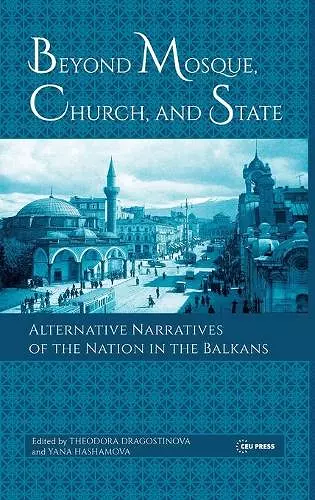Beyond Mosque, Church, and State
Alternative Narratives of the Nation in the Balkans
Yana Hashamova editor Theodora Dragostinova editor
Format:Hardback
Publisher:Central European University Press
Published:20th Aug '16
Currently unavailable, and unfortunately no date known when it will be back

Journalists and policy-makers in the West have often assumed that the religious and ethno-national heterogeneity of the Balkans is the underlying reason for the numerous problems the area has faced throughout the twentieth century. The multiple and turbulent political transitions in the area, the dynamics of the interaction between Christianity and Islam, the contradictory and constantly shifting nationality policies, and the fluctuating identities of the diverse populations continue to be seen as major challenges to the stability of the region. By exploring the development of intricate religious, linguistic, and national dynamics in a variety of case studies throughout the Balkans, this volume demonstrates the existence of alternatives and challenges to nationalism in the area. The authors analyze a variety of national, non-national, and anti-national(ist) encounters in four areas—Bosnia, Bulgaria, Macedonia, and Albania—traditionally seen as “hot-beds” of nationalist agitation and tension resulting from their populations' religious or ethno-national diversity. In their entirety, the contributions in this volume chart a more complex picture of the national dynamics. The authors recognize the existence of national tensions both in historical perspective and in contemporary times, but also suggest the possibility of different paths to the nation that did not involve violence but allowed for national accommodation and reconciliation.
"This innovative volume is a welcome contribution to the scholarship, with its potential to change our thinking about the Balkans, which had been too dependent on the category of the nation. This is a must-read book for both students of Balkan history with diverse disciplinary backgrounds, and the general educated reader interested in the historical and contemporary debates on the Balkans." * American Historical Review *
"The introduction to the book opens with a mise en scène from the early 1900s in which a British journalist expresses amazement with the many, often changing nationalities that inhabit the Balkans. The co-editors/co-authors, Theodora Dragostinova and Yana Hashamova, point to the paradox of such diversity owing to 'the stubborn inability of people [in the region] to recognize and share their common history and culture'. As the introduction ends, readers are poised to encounter fresh perspectives on how ethno-religious, linguistic, and national differences have been legislated, performed, enacted, and amended by subjects, citizens, and political parties, and from topdown and bottom-up political actors in empires and (nation-)states. Special attention is paid to processes of negotiation between religions and between official discourse and everyday practices as they expose 'the existence of alternatives and challenges to nationalism in the area'." * Canadian Slavonic Papers *
"This year marks the twentieth anniversary of the publication of Maria Todorova’s Imagining the Balkans (1997), a seminal study that explored the ontology of the Balkans and elucidated the ways in which an otherwise neutral geographic appellation was gradually transformed into an insidious stereotype and set of popular myths. Her work unleashed a procession of studies of “Balkanism,” or the Balkans as construct, which collectively succeeded in laying to rest these myths. The book under review fits this mold and asks us once again to question the traditional Western narrative vis-à-vis the Balkans: namely, as a region characterized by endemic ethnic and religious violence. All in all, the chapters in this book are well written and thoughtfully considered. The book’s interdisciplinary approach is also one of its strongest attributes." * Journal of Church and State *
"Beyond Mosque, Church, and State is a useful resource for scholars engaged in research on nationalism, identity, memory and culture in post-Ottoman Balkan states, as it invites creating space for wider engagements with nations and nationalism outside more traditional and top-down understandings of these phenomena. An edited volume like Beyond Mosque, Church, and State can provide a wealth of varied knowledge across an extended timespan – from the fall of Constantinople to the most recent parliamentary elections in Bulgaria – that shows how valuable and persistent alternative (and accordingly under-researched) conceptualizations of the nation and the state are in times of social upheaval." * Nationalism and Ethnic Politics *
"The chapters in this volume vividly show how important intellectuals and other elites have always been, since the formative stages of nation-building and until today. The authors take the reader along the path that connects the Muslim and Christian communities in the Balkans since the late Ottoman Empire to their integration—or their desire to integrate—into the EU. What becomes obvious is how prejudices and stereotypes have always had a significant influence on the shape of a nation’s policies." * Südosteuropa *
"The volume’s chapters demonstrate the processes through which several agents of the Balkan nation-states have engulfed a multitude of local identities in order to obtain the much-cherished objective of national conformity or homogeneity." * Slavic Review *
ISBN: 9789633861332
Dimensions: unknown
Weight: 770g
332 pages